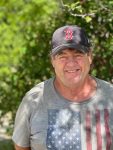Master of the Fishermen’s Clambake

Jeff LaValley, Bakemaster
 Nothing says New England like a clambake, and no event upholds that tradition better than the annual Fishermen’s Clambake in Westport. Just like an orchestra needs a maestro, a successful clambake needs a bakemaster. The maestro of the Fishermen’s Clambake is Jeff LaValley, who has been master of the bake for many years. Looking forward to this year’s Clambake on September 18th at Buzzards Bay Brewing in Westport, we decided to interview our bakemaster for a little history and a lot of insight into what makes the Fishermen’s Clambake so great.
Nothing says New England like a clambake, and no event upholds that tradition better than the annual Fishermen’s Clambake in Westport. Just like an orchestra needs a maestro, a successful clambake needs a bakemaster. The maestro of the Fishermen’s Clambake is Jeff LaValley, who has been master of the bake for many years. Looking forward to this year’s Clambake on September 18th at Buzzards Bay Brewing in Westport, we decided to interview our bakemaster for a little history and a lot of insight into what makes the Fishermen’s Clambake so great.
BBC: How did you become connected with Buzzards Bay Coalition? Was it just through the Clambake or some other way?
JL: It just sort of happened because you took on the Westport Fishermen’s Association Clambake. I was on the WFA board of directors when we merged with the Coalition in 2018, and that’s exactly what I think should have happened. I got involved because I just wanted to do my part to save the Bay and save the environment.
BBC: Have you always lived in Westport?
JL: I was born in Springfield, and we used to come to the South Coast every summer for 25 years. My dad was a school teacher and then a commercial fisherman in the summers. After I got out of the military, I needed a place to go, so I thought, why not go to the place I went on vacation? I think that’s the best place to be. I worked in Westport as a landscaper and a carpenter, then I got a degree in culinary arts from Johnson and Wales.
BBC: Your wife also plays a pivotal role in the Fishermen’s Clambake; how did you two meet?
JL: We actually met at a clambake, through our best friend who taught me how to do clambakes. It was the Fire Station Clambake over in District 2 in Dartmouth. I did that clambake for a number of years before I even met her. Our first date was a Rolling Stones concert!
We did a lot of clambakes together at our church, Westport Point Church, for about fifteen years. And that’s how I learned to do them.
BBC: Until you said that, it never occurred to me how one learns to become a bakemaster. What is that process like?
JL: That process is difficult. You have a learning phase. You’ve got to go with these guys for years basically to figure out, I’ve got to get this particular type of rock, this size of rock. I’ve got to get this particular kind of wood — this size, this much. I need this many clams…there’s a lot to learn. And there’s a lot to know, especially when you are doing it for 300 or 400 people. It was just repetition, having to do it again and again, many times.
BBC: It’s really seems to be baked in so much tradition (pun intended)!
JV: Big time. That’s what it’s all about. That’s why I do it. It’s really all about the tradition. It’s about carrying on something that’s been done for 200 years. It’s cooking with seaweed- where else do you cook with seaweed…and rocks and wood? And that’s your oven. I love it. It’s just so cool to be able to do that, and to use my degree in that way I think is a really neat way to do it.
I enjoy every single clambake because I meet so many cool people. There are 450 people involved in the day, including staff, and you have to feed them all. It’s a big task. It’s a tall order. It feels really good at the end of the day to say, we just did that!
BBC: This year, you can enter to win two amazing prizes in our double prize drawing: a beautiful 15-foot rowboat, or a private sunset sail for 8 on the Coalition’s Drascombe Gig. Which would you rather win?
 JL: The rowboat! That I would like, for sure.
JL: The rowboat! That I would like, for sure.